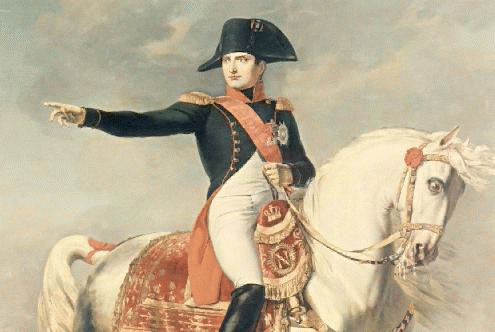Napoleon Bonaporte
This content was created/compiled by Emma Dolan.
 In Brief:
In Brief:
After the turmoil of the Reign of Terror, order was eventually restored by a new government called the Directory. One man eventually rose to control the directory and eventually all of France. This young general from the Mediterranean island of Corsica was called Napoleon Bonaporte. He went on to declare himself Emperor of France (1804) and led the French army as they conquered most of Europe before being finally defeated at the Battle of Waterloo. He was captured and imprisoned on the island of St. Helena where he stayed until his death in 1821.
________________________________________________________________________________________________________________
[youtube]http://www.youtube.com/watch?v=rojKZgdW5B0&feature=related[/youtube]
________________________________________________________________________________________________________________
Napoleon Bonaparte was Empire of France in the early 19th century. He is considered to be one of the most brilliant military leaders in history.
Early Life
Napoleon Bonaparte who is also known as the “little Corsican,” was born on August 15, 1769 in the city of Ajaccio, Corsica To a family of minor nobility. Napoleon was known as the little Corsican because of his height. In March 1779, his father sent him to the military school in Brienne. His achievements, particularly in mathematics, helped him win a place at the Royal Military School in Paris in October 1784. He was later accepted into the prestigious artillery section of the army. In December 1793, at the siege of Toulon, he played a major part in retaking this strategic port from the Royalists and their British allies. Within two years – in October 1795 – he had become Commander of the Army of the Interior.
First Consul
After success leading the Italian army in 1799, Napoleon staged a coup and declared himself First Consul of France. He revised many French laws, giving more freedom to the people, including expanded religious tolerance and the abolition of serfdom. He became enormously popular among the French people.
Empire
In 1804, after being declared “Consul for Life” by the people, Bonaparte crowned himself Emperor of France. With the confidence of this title, Napoleon began war efforts against nearly every major European power. These efforts were extremely successful.
Downfall
The end for Napoleon came when he led a coup in Spain, establishing his brother, Joseph Bonaparte as the new king. The Spanish people rebelled and Napoleon had to commit endless troops to keep the nation under control. Over the next few years, Napoleon and his troops suffered serious losses to the Russians and the other European powers took advantage of the weakened state of his army.
Exile & Death
Defeated by the Sixth Coalition (including Austria, Prussia, Russia, and Britain), Napoleon was exiled to the island of Elba. He returned to France in 1815 to make an attempt at regaining power. He was defeated by the Prussian army and exiled again, this time to St. Helena. He died on the island in 1821.
_______________________________________________________________________________________________________________
Important Dates
| 1769
Napoleon was born 1779 Napoleon went to a military school in Brienne 1784 Napoleon went to a Royal Military School in Paris 1793 At the siege of Toulon, Napoleon played a major part in retaking this strategic port from the Royalists and their British allies. 1795 He had become Commander of the Army of the Interior. 1799 Napoleon staged a coup and declared himself First Consul of France 1804 Napoleon crowned himself Emperor of France. 1815 Napoleon returned to France to make an attempt at regaining power. 1821 Napoleon dies on St. Helena. _____________________________________________________________________________________________________________________________ History@Banagher College, Coláiste na Sionna |
The URI to TrackBack this entry is: http://teachnet.eu/tobrien/about/revolutions/the-french-revolution/napoleon-bonaporte/trackback/
One Comment Leave a comment.
Leave a Comment
You must be logged in to post a comment.



very interesting, thanks